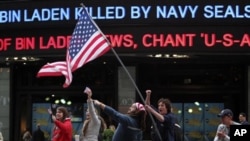As soon as he heard about the raid that ended the life of America's most wanted man, James Kotecki joined people celebrating in front of the White House in the middle of the night.
Kotecki, is a vlogger - or video blogger. So he posted a video that shows him on the scene, shouting.
"Osama bin Laden is dead! All these people are partying! There's flag waving, balls bouncing. Earlier there was a guy climbing up that light post. These people are pumped and for good reason!"
Many of the people there were around the same age as Kotecki. He was just a teenager when planes flown by al-Qaida hijackers killed thousands of people on September 11, 2001.
Later in an interview, Kotecki said he didn't know what motivated the others to celebrate. "But the way that I approached it was certainly not about rejoicing in a specific person's death per se," he said.
It was, he says, about the accomplishment of a national security objective - the elimination of a global terrorist figurehead.
"This doesn't mean that I don't also - as I step back from the celebration of that moment - reflect on the tragedies of the lives that were lost, both on September 11 and in the ensuing war on terror," he added.
Jubilation over the killing of Osama bin Laden has given way to a soul-searching debate in the United States over whether it is appropriate to celebrate the death of someone who orchestrated the nation's deadliest terrorist attack.
While many people defended the celebrations as natural human reaction, others condemned what they saw as immoral and jingoistic behavior. The debate was especially intense on social media sites.
Denver-based radio host David Sirota wrote a commentary on Salon.com entitled: 'USA! USA!' Is The Wrong Response'. It got more than 100,000 thumbs up responses on Facebook.
"I certainly feel relief that Osama bin Laden is no longer a threat to the United States, a threat to the world," he said.
But he adds that rejoicing over a killing is the kind of behavior Americans have attributed to terrorists and other people they despise. "And yet we are now - in the aftermath of bin Laden's killing - we're doing the same thing," he said. "We're celebrating not the end of a war, we're celebrating revenge, we're celebrating bloodletting."
After the September 11th attacks in the United States, many Americans were outraged to see rejoicing in parts of the Muslim world.
Sirota argues that the celebrations here may be an unintended consequence of the war on terror.
"There's a chance," he said, "that we may have inadvertently let Osama bin Laden win. That is, we have let him, and what he represents, change us, bring us down, make us more of a nihilistic people."
Sirota says bin Laden's demise cannot be compared to the death of Hitler and the end of World War II, because the war against terrorism continues.
But others say bin Laden's death provided a catharsis for a traumatized nation.
The Rev. Paul Raushenbush is the senior religion editor for the online news site Huffington Post.
"Osama bin Laden was almost like a specter that hovered around our psyche," he said. "And in some ways it's like the end of the movie where the specter is destroyed, and now we can live without that shadow upon us."
U.S. President Barack Obama has cautioned that effort against terrorism still continues. But for many Americans, the lightning raid that took out al-Qaida's leader marks a liberation from a trauma that began on September 11, 2001, and from the mixed record of other military actions since then.
Americans Ask: Is It Right to Celebrate bin Laden's Death?




